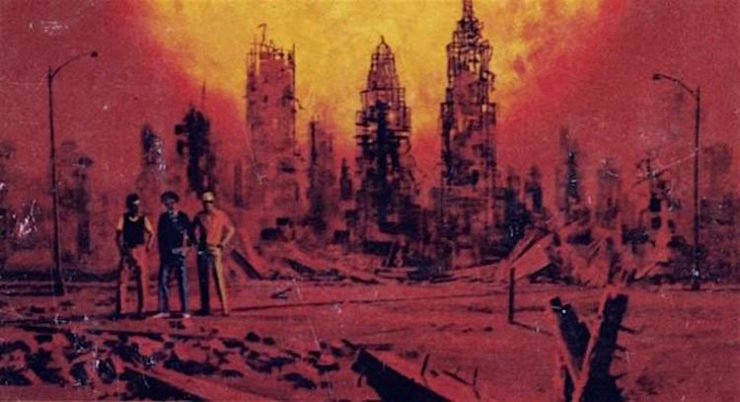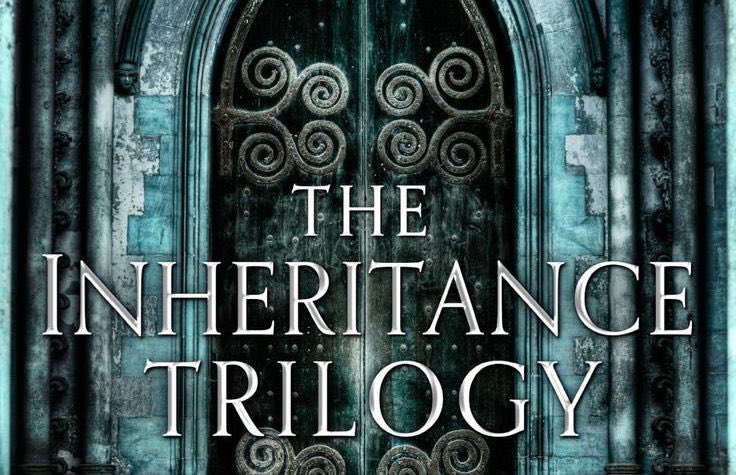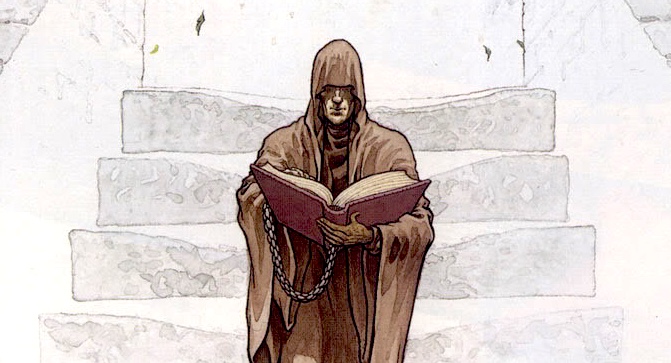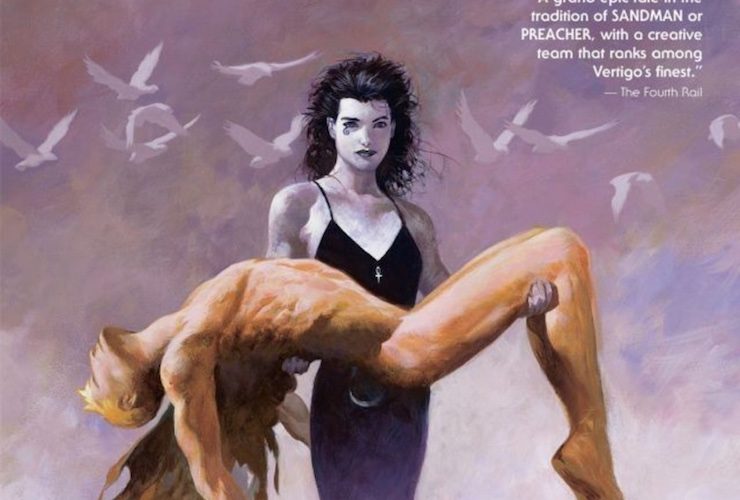It happens to us all: those hurry-up-and-wait stretches of time where we’re stuck on the train/tarmac/traffic jam, or our device is out of power, or we just need to disengage. Moments like these are perfect for marathon-length reads; those big big books and series that draw you in completely, which are so engrossing that the Earth turns without you.
And sure, The Lord of the Rings definitely fits that bill, but odds are you’ve already read that! What else does the trick? Below, the Tor.com staff shares some of their favorite marathon reads.
The Sandman by Neil Gaiman, But Chronological

You’ve probably already read Neil Gaiman’s comics masterwork, The Sandman, but have you read it in chronological order? Because, with this helpful guide, you can reread the tale of the Endless from its origins, millennia before humanity, all the way to it’s far-off future in…oh, in 1997. If you’ve already read the series in publication order, it’s a fascinating exercise to see how Gaiman threaded so many stories together, planting references and clues that in some case, took years of weekly issues to return to. Reading the series chronologically will also give you a new perspective on the massive scope of Gaiman’s project, as he works out ways for his characters to comment on the evolution of storytelling itself over thousands of years. —Leah
Lucifer by Mike Carey
Wow, Leah’s suggestion of Sandman is so dang good that I feel obligated to include its spin-off title Lucifer, penned faithfully by Mike Carey. It’s not quite as complex, but Sandman readers will absolutely recognize the same eldritch-and-leather feeling that suffuses Gaiman’s Sandman. Carey takes Lucifer to very interesting places, post-Hell, and somehow manages to grow Lucifer as a character without sacrificing his mythic core characteristics. There is a very real sense that evil no longer comes easily to Lucifer, but neither does sympathy, and is this what it means to be a supreme being? Vertigo recently compiled the entire 75-issue run into four convenient trades and they’re worth every dollar. They grab hold and don’t let go. —Chris
Kushiel’s Dart by Jacqueline Carey

Like Leah with Infinite Jest (below), I’m that person with Kushiel—I co-ran an entire reread of Kushiel’s Legacy, the first of three trilogies set in Terre d’Ange, or the Land of Angels. Usually I rope people in with the elevator pitch: courtesan-spy Phèdre nó Delaunay uses her gods-granted kinkiness to extract secrets from the nobles in the City of Elua. The worldbuilding is stellar, the court intrigue is compelling, the sex scenes are the kind where you glance around guiltily before sinking further into your armchair to reread while trying to hide your blush. It’s the kind of book that I can’t believe I didn’t discover until my mid-20s, and so I endeavor to be that person shoving it in front of everyone who hasn’t laid eyes on that striking cover (covers, actually) before.
But usually once I bring Kushiel’s Dart to people’s attention, they’re still leery of committing to a 900-page book, with good reason. I would imagine the effect is lessened if you can only read in chunks here and there, though the chapters are very short to allow for popping in and out of the yarn that Phèdre is spinning for you. But you’re reading this list because you have a sustained chunk of time to get lost in a book, which is exactly the kind of reading experience that a lush fantasy like this was made for. The first half alone is full of coming-of-age trials, a bevy of assignations ranging from the sweet to the sadistic, and two lavish Midwinter Masque celebrations. You’d better get started—each subsequent book is just as long, and you’re going to get hooked. —Natalie
Dhalgren by Samuel R. Delany

What can I say about Dhalgren? It turned 40 last year. It was a giant hit, and sold half a million copies in its first two years of publication. It’s a little over 800 pages long in paperback, so it certainly qualifies as a long read. But that’s not why I’m including it here. Like a lot of Delany’s work, it welcomes you into a lush, all-encompassing dreamworld that will quickly come to feel like the only world you’ve ever known. It will become harder and harder to put the book down, and it reality will take on a color that this bland carapace will never match. There is a plot, but that’s not why you’re here. You’re here because if you go back to the park at the right time, and look at the moon the right way (no, not that moon, the other moon) you might see the truth. You might understand something about this country that you’ve never understood before, and you might see yourself. —Leah
The Inheritance Trilogy by N.K. Jemisin

A few years ago I read N.K. Jemisin’s The Hundred Thousand Kingdoms, which does wonderful things with the court-intrigue tropes of fantasy. It’s truly high fantasy: the palace in which our heroine, Yeine, finds herself is sky-high, home only to the ruling family of this world. Unexpectedly, Yeine’s been named one of three potential heirs to the kingdom. This is a problem all by itself—she’s been living far from the palace, a leader in her barbarian homeland—but then there’s the additional issue of the heirs trying to kill each other, with the help or hindrance of a set of enslaved gods. Yeine is beyond “in over her head”, and Jemisin compellingly details her tense experience navigating treacherous political terrain. But Jemisin is also a masterful worldbuilder, a wise investigator of how cultures form, interact, stagnate, clash, and grow, and the world she creates here is one that could sustain many stories. There are two more books in the trilogy—The Broken Kingdoms and The Kingdom of Gods—and I still regret not reading them all in one intensely magical literary swoop. Helpfully, in 2014 Orbit released an omnibus edition of all three, so if you would like to start the series and then have absolutely no reason to stop until the end, you’re all set. —Molly
Y: The Last Man by Brian K. Vaughan and Pia Guerra

Y is like a multi-sequel movie series in graphic novel form: Guerra’s dynamic, fast-paced art reads like heavily detailed storyboards, and Vaughan’s plot—about Yorick Brown, the sole survivor of a plague that wipes out every organism with an XY chromosome—feels especially relevant these days. It’s not so much escapism as an alternate-universe timeline brushing up uncomfortably close, as the women left behind restructure every facet of society, from fighting over their husbands’ seats in Congress to establishing pecking orders in modern Amazonian biker gangs, theater troupes, and pirate ships. Before Y becomes the next item on your binge-watching list, read the clever, sexy, heartbreaking series that started it all. Vertigo has collected the series in ten trades (or five deluxe volumes), which you’ll speed through with enough time to immediately start over and catch every little Y-shaped piece of art you missed on the first read. —Natalie
Infinite Jest by David Foster Wallace

I’m that annoying jerk who keeps bugging you to read Infinite Jest. I’m the person who, if you ask for a book recommendation, will just say Infinite Jest five times. I’m the person who, if I see you already reading Infinite Jest, will make a point of asking you how you’re enjoying it, or telling you to keep going, or asking where you are. I belong to multiple David Foster Wallace-based Facebook groups and listservs. The Infinite Map hangs on my wall.
I am going to try to not be that jerk for the next few moments, as I humbly ask you for a moment of your time. Infinite Jest is, truly, the best choice for reading over a long weekend. It’s a demanding book. To fully experience it you’ll need to read the main section of the book, the first 983 pages, while constantly flipping back to the 96 pages of endnotes. You’ll probably also want to keep a bookmark on page 223 so you can refer back to the chronology, since most of the action takes place after time has been subsidized, and you can never be sure what year it is. I realize that this is a huge commitment, even for people who happily digest fat fantasy books. But I can think of no book that more perfectly captures our current world. More importantly? It might be the funniest thing you’ll ever read. Most importantly? I think it’s the most deeply empathetic and heartbreaking book I’ve ever read. —Leah
What long marathon-length reads are you bringing with you for the extended Thanksgiving holiday weekend?











